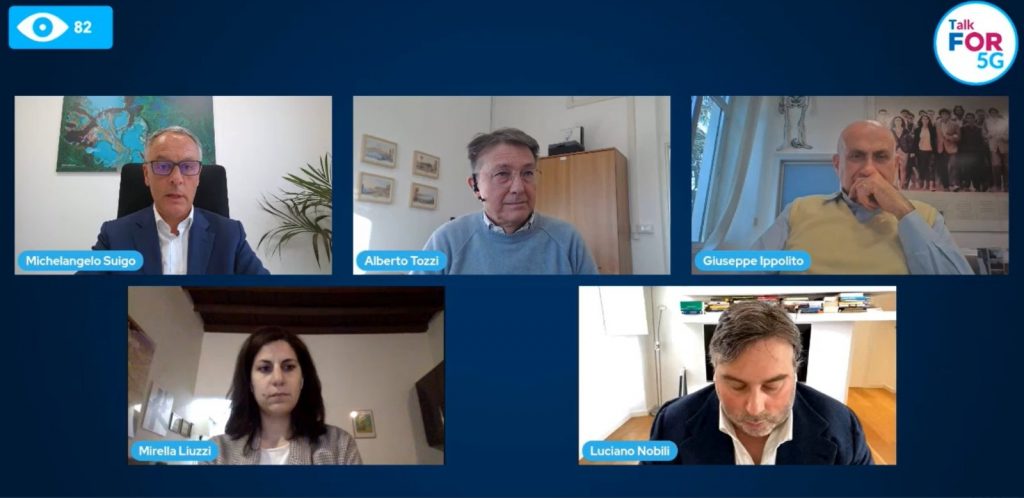Healthcare and 5G: a step toward the future

“Healthcare: the future will work remotely” was the topic of the third installment of #TalkFor5G, a webinar series organized by INWIT
The third installment of the #TalkFor5G webinar series, organized by INWIT in collaboration with the Ottimisti&Razionali Foundation, was called “Healthcare: the future will work remotely”. The live streamed event included a panel of experts to understand, without prejudice, what 5G can improve in healthcare and how.
After the first two events, titled “The value of 5G: potential and services. 5G among fears, fake news and disinformation: could it be we need more information?” and “5G and electromagnetism: involving communities and combating fake news” – this time, the focus of the discussion was health, innovation and the future, precisely at a time when the need to digitize healthcare structures has become extremely urgent.
Suigo: “5G is driving an innovative push forward in the sector”
“In recent years, we’ve seen a substantial rise in the use of all things digital in the healthcare sector,” said Michelangelo Suigo, External Relations & Communication Director at INWIT, “with observable changes in both services offered and their delivery methods. The pandemic has certainly accelerated this and shown us how much a significant reorganization of this sector is needed. Technology, starting with 5G, is a driving force for an innovative push forward in this field. Just think of the possible applications in telediagnosis, real-time patient monitoring, even remote surgery. Only by combining technological innovation, infrastructural development and faster network creation will it be possible for citizens and the healthcare system to use 5G services.”
Ippolito (INMI Spallanzani): “Future healthcare will need different interoperability systems”
“We need to figure out how we can capitalize on Artificial Intelligence to interpret radiological information,” said Prof. Giuseppe Ippolito, Scientific Director at the INMI Lazzaro Spallanzani Hospital and confirmed to the Draghi government’s Scientific and Technical Committee, “since the systems have recently been put to the test by the increase in demand for performance. At a time like this, reducing latency is essential, in light of the fact that we have examples where Artificial Intelligence platforms have facilitated the early detection of sick people at risk. Platforms that don’t crash when dealing with critical patients and remove the need for manual maintenance and control. The future of healthcare will need different interoperability systems,” Ippolito continued, “but we still don’t completely understand the potential of Artificial Intelligence. Remote patient management with new technologies, for example, was limited during the pandemic, probably because we as a culture are not accustomed to approaching healthcare in this way.”
Tozzi (IRCSS Bambino Gesù): “5G necessary for telemedicine”
“The pandemic, for all its drama, is a chance to make a digital leap forward,” explained Dott. Alberto Tozzi, Head of the Telemedicine Unit at IRCCS Bambino Gesù Pediatric Hospital. “5G is part of a nervous system we want to build, for which we need connectivity and speed. Artificial Intelligence and Augmented Reality in healthcare are good practice, already allowing us to optimize processes,” for example, by creating a “digital twin” for the hospital to run simulations to find the ideal scenario, “but this is just one of the countless applications. 5G, for example, can enable complex processes in the patient journey, which should be rethought as a whole. Technology can be a solution to problems: if we can identify them, it will certainly be of help.”
Liuzzi (M5S): “The future is technology applied to services”
“5G will change daily life in healthcare. The future is not just technology per se, but how it is applied to services,” said Hon. Mirella Liuzzi (M5S), former Undersecretary in the Ministry of Economic Development, with 5G delegation and a member of the Chamber’s Transport, Postal and Telecommunications Commission. “And healthcare is certainly one of the clusters where 5G can make a significant contribution. This goal can be achieved by taking advantage of the potential of wearable tech and remote surgery, provided that consistent levels of digitalization and infrastructure are reached nationwide. Art. 38 of the Simplification Legislative Decree has made it easier to create infrastructure in the country. The National Recovery and Resilience Plan (PNRR) calls for a core group of sectors that will benefit from the potential of 5G, which will be expanded bit by bit.”
Nobili (Italia Viva): “Continue with regulatory simplification to encourage the creation of the 5G network”
“During this emergency, we need to demonstrate the benefits 5G can provide for healthcare, telemedicine and telediagnosis,” explained Hon. Luciano Nobili (Italia Viva), member of the Chamber’s Transport, Postal and Telecommunications Commission. “We need to continue with regulatory simplification to encourage the creation of the 5G network in the hospital system and strengthen the role of 5G in Next Generation EU with the PNRR. To support the spread of 5G, legislative action for bureaucratic simplification is key, to guarantee advanced and multi-operator networks. For this, we need cooperation between political groups.”
The relevant discussions of this third installment can be read again in a Twitter live feed of the event.